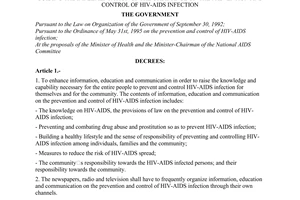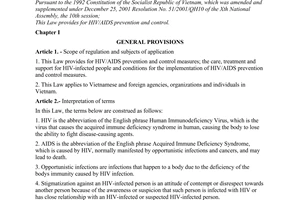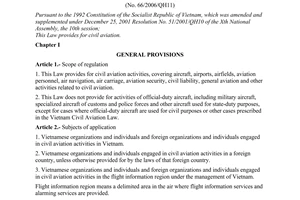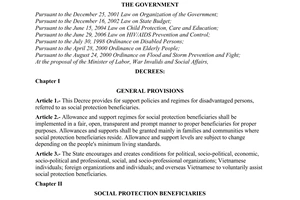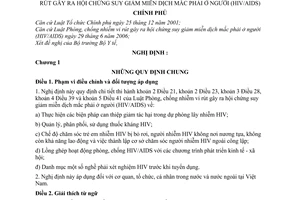Nội dung toàn văn Decree No. 108/2007/ND-CP of June 26, 2007, detailing the implementation of a number of articles of the Law on HIV/AIDS prevention and control.
|
THE GOVERNMENT |
SOCIALIST REPUBLIC OF VIETNAM Independence - Freedom - Happiness |
|
No. 108/2007/ND-CP |
Ha Noi, June 26, 2007 |
DECREE
DETAILING THE IMPLEMENTATION OF A NUMBER OF ARTICLES OF THE LAW ON HIV/AIDS PREVENTION AND CONTROL
THE GOVERNMENT
Pursuant to the December 25, 2001 Law of Organization of the Government; Pursuant to the June 29, 2006 Law on HIV/AIDS Prevention and Control;
At the proposal of the Minister of Health,
DECREES:
Chapter I
GENERAL PROVISIONS
Article 1.- Scope of regulation and subjects of application
1. This Decree provides in detail the implementation of Clause 2, Article
21, Clause 2 of Article 23, Clause 3 of Article 28, Clause 4 of Article 39, and Clause 5 of Article 41 of the Law on HIV/AIDS Prevention and Control, regarding:
a/ Implementation of harm reduction intervention measures in the prevention of HIV transmission;
b/ Management, distribution and use of HIV drugs;
c/ Care for abandoned HIV-infected children, HIV-infected persons who have nobody to rely on or have no working capacity; and the setting up of non- public establishments for caring for HIV-infected persons;
d/ Integration of HIV/AIDS prevention and control activities into socio- economic development programs;
e/ List of occupations which require HIV testing prior to recruitment.
2. This Decree applies to Vietnamese agencies, organizations and individuals and foreign agencies, organizations and individuals in Vietnam.
Article 2.- Interpretation of terms
1. Outreach workers are those who directly participate in implementing harm reduction intervention measures in the prevention of HIV transmission and are granted cards as provided by law. They include peer communicators and other volunteers.
2. Peer communicators are volunteers who carry out propaganda and mobilization and assist those who have similar circumstances and lifestyles in understanding and implementing HIV/AIDS prevention and control measures.
3. Clean needle and syringe are sterilized instruments of injection which are for one-time use only.
4. Addiction to opiate substances is the addiction to opium and natural, semi-synthetic or synthetic substances which have pharmacological effects like opium.
5. Treatment of addiction to opiate substances with substitution drugs is the administration of a drug containing some synthetic opiate substances to replace addiction to opiate substances in combination with psychological and social supports so as to reduce addicts’ use of opiate substances without causing psychiatric toxicity, increasing doses or other effects.
6. HIV medicines are specific medicines that are used for HIV-infected or - exposed persons to suppress the duplication of the human immunodeficiency virus or prevent HIV transmission, but are other than those used to treat opportunistic infections in HIV-infected persons.
Article 3.- Prohibited behaviors
1. Hindering the implementation of programs and projects to deploy harm reduction intervention measures in the prevention of HIV transmission.
2. To take advantage of harm reduction intervention measures in the prevention of HIV transmission to abet or organize prostitution and drug trafficking activities.
3. To sell syringes, condoms, drugs administered in replacement of opiate substances and HIV medicines which are prescribed to be supplied free of charge.
Chapter II
HARM REDUCTION INTERVENTION MEASURES IN THE PREVENTION OF HIV TRANSMISSION
Article 4.- Harm reduction intervention measures in the prevention of HIV transmission
1. Provision of condoms and guidance on condom use.
2. Provision of clean needles and syringes and guidance on their use.
3. Treatment of addiction to opiate substances with substitution drugs.
Article 5.- Target groups of harm reduction intervention measures in the prevention of HIV transmission
Harm reduction intervention measures in the prevention of HIV transmission are applied to the following groups:
1. Sex workers and their customers;
2. Addicts to opiate substances;
3. HIV-infected persons;
4. Persons having homosexual relations;
5. Mobile population group;
6. Persons having sexual relations with those specified in Clauses 1, 2, 3, 4 and 5 of this Article.
Article 6.- Competence to decide on implementation of harm reduction intervention measures in the prevention of HIV transmission
1. Harm reduction intervention measures in the prevention of HIV transmission are implemented under programs and projects approved by competent state agencies defined in Clause 2 of this Article.
2. Competence to approve programs and projects funded with capital from the state budget or other sources is prescribed as follows:
a/ The Minister of Health approves those programs and projects to operate in two or more provinces;
b/ Ministers or heads of ministerial-level agencies with functions related to HIV/AIDS prevention and control approve programs and projects to operate within the scope under their respective management;
c/ Presidents of People’s Committees of provinces or centrally run cities approve programs and projects to operate in their respective localities.
3. Competence to approve programs and projects funded with official development assistance complies with the Government’s Decree No 131/2006/ND-CP of November 9, 2006, promulgating the Regulation on management and use of official development assistance.
Article 7.- Rights and responsibilities of outreach workers who participate
in implementing programs and projects on harm reduction interventions in the prevention of HIV transmission
1. Outreach workers who participate in programs or projects on harm reduction interventions in the prevention of HIV transmission are entitled to:
a/ Benefits and allowances from these programs and projects;
b/ Protection by law when providing condoms, clean needles and syringes or treatment of addition to opiate substances with substitution drugs for those stated in Article 5 of this Decree;
2. Outreach workers who participate in programs or projects on harm reduction interventions in the prevention of HIV transmission have the following responsibilities:
a/ To notify the commune-level People’s Committee and police before implementing harm reduction intervention measures in localities;
b/ Use their cards in performing their assigned tasks.
3. The Ministry of Health shall assume the prime responsibility for, and coordinate with the Ministry of Public Security in, guiding criteria for card holders; the form of the card; the issuance, management and use of cards nationwide when implementing programs or projects on harm reduction interventions in the prevention of HIV transmission.
Article 8.- Provision of condoms and guidance on condom use
1. Condoms are provided free of charge or sold at subsidized price under programs or projects to those stated in Article 5 of this Decree by outreach workers holding cards or through the network of condom distribution points stated in Clause 3 of this Article..
2. Condoms provided free of charge as stipulated in Clause 1 of this Article must have the phrase “For free distribution only, not for sale” on their packings or supplementary labels.
3. Managers of programs or projects may:
a/ Expand the network of free-of-charge condom distribution points, install condom vending machines and arrange condom retail points in entertainment centers, railway or bus stations, hotels, guest houses, restaurants and other accommodation service facilities;
b/ Promote the free-of-charge provision of condoms and the sale of condoms at subsidized price to users.
4. Managers of programs and projects shall:
a/ Provide guidance on proper condom use;
b/ Notify the commune-level People’s Committee and police before providing condoms and guidance on condom use.
5. Owners of entertainment centers, railway and bus stations, hotels, guest houses, inns, restaurants and accommodation service facilities are responsible for collaborating with programs and projects in providing condoms free of charge or installing condom vending machines within their establishments.
6. The People Committees at all levels and police offices at the same level are responsible for creating favorable conditions for programs and projects to operate and develop the network of condom distribution points in their localities.
Article 9.- Provision and guidance for use of clean needles and syringes
1. Clean needles and syringes are provided free of charge under programs and projects to injecting drug users by outreach workers holding cards or through the network of clean needles and syringes distribution points stated in Clause 5 of this Article.
2. Needles and syringes stated in Clause 1 of this Article must have the phrase “For free distribution only, not for sale” on their packings or supplementary labels.
3. When distributing clean needles and syringes to injecting drug users, outreach workers shall:
a/ Instruct the safe use of needles and syringes;
b/ Distribute correct quantities of clean needles and syringes provided by the program or project, and collect all used ones in safe hard-shell containers and carry them to prescribed places for destruction in accordance with the law on waste disposal;
4. Injecting drug users shall collect used needles and syringes and hand them to outreach workers according to Point b, Clause 3 of this Article.
5. Programs and projects may expand their fixed or mobile networks of providing clean needles and syringes at HIV/AIDS prevention and control centers, provincial- and district-level preventive medicine centers, drug stores, voluntary counselling and testing centers and other appropriate sites.
6. People’s Committees at all levels and polices of the same level are responsible for creating favorable conditions for programs and projects to operate and develop clean needle and syringe distribution points in their localities.
Article 10.- Treatment of addiction to opiate substances with substitution drugs
1. Treatment of addiction to opiate substances with substitution drugs is provided at medical establishments which have adequate physical facilities, equipment and personnel and are designated by provincial or municipal-level Health Services through programs or projects approved by competent state agencies defined in Clause 2, Article 6 of this Decree. Treatment of addition to opiate substances with substitution drugs is not permitted at medical treatment establishments set up under the Ordinance on Handling of Administrative Violations.
2. Treatment of addiction to opiate substances with substitution drugs is provided only to addicts of opiate substances who voluntarily and commit in writing to adhere to the treatment guidelines. For addicts aged under 16 years, their parents or lawful guardians shall express their consent and commit in writing to adhere to the treatment guidelines.
3. Substitution drugs must be granted registration numbers by the Ministry of Health for circulation.
4. Addicts to opiate substances shall use substitution drugs under the supervision of health workers.
5. During the process of treatment of addition to opiate substances with substitution drugs, addicts to opiate substances will not be confined to medical treatment establishments set up under the Ordinance on Handling of Administrative Violations, unless they illegally use narcotics.
6. Only medical doctors and assistant doctors who have completed training in treatment of addiction to opiate substances with substitute drugs according to regulations of the Minister of Health and are assigned by the medical establishments stated in Clause 1 of this Article can prescribe substitution drugs for addicts to opiate substances who are on the list for such treatment under the program or project approved by a competent state agency.
7. Substitution drugs used in the treatment of addition to opiate substances shall be managed in accordance with the law on management of habit-forming drugs and psychotropics.
8. The Minister of Health shall issue specific guidance on the conditions of medical establishments designated to provide treatment of addition to opiate substances with substitution drugs, and procedures and guidelines for treatment of addition to opiate substances with substitution drugs.
Article 11.- Supervision and monitoring of harm-reduction interventions in the prevention of HIV transmission
1. Contents of supervision and monitoring:
a/ Supervising and monitoring the compliance with the laws and the programs’ or projects’ rules in the implementation of harm reduction interventions in the prevention of HIV transmission by outreach workers;
b/ Supervising and monitoring the performance of practical activities by outreach workers of programs and projects on harm reduction interventions in the prevention of HIV transmission;
c/ Supervising and monitoring the programs’ and projects’ implementation of harm reduction interventions in the prevention of HIV transmission according to the approved program and project activities.
2. Supervising and monitoring responsibilities:
a/ Directors of projects and programs and persons in charge of outreach workers shall monitor and supervise the implementation of harm reduction interventions in the prevention of HIV transmission by outreach workers. When detecting any outreach worker who fails to comply with the program’s or project’s rules or commit a law-breaking act, to immediately stop the worker’s act, withdraw his/her card and report to competent state agencies for consideration and handling in accordance with law;
b/ Provincial-level agencies in charge of coordinating HIV/AIDS prevention and control shall collaborate with police offices and social evil prevention and combat agencies in supervising and monitoring activities of programs and projects on harm reduction interventions in the prevention of HIV transmission in the provinces. If detecting activities beyond the program or project contents already approved by competent authorities or poor management of outreach workers, to immediately report it to the provincial-level People’s Committee president or the Ministry of Health, which has approved the program or project concerned, for timely handling in accordance with law.
Chapter III
MANAGEMENT, DISTRIBUTION AND USE OF HIV MEDICINES
Article 12.- Management of HIV medicines
1. Locally manufactured and imported HIV medicines must have registration numbers issued by the Ministry of Health prior to circulation.
2. HIV medicines are on the list of essential medicines and the list of drugs subject to prescription and sale under prescriptions, which are issued by the Minister of Health.
3. HIV medicines procured with state budget funds or donated by domestic or foreign individuals and organizations are provided free of charge to HIV- infected persons stipulated in Article 39 of the Law on HIV/AIDS Prevention and Control.
Article 13.- Distribution of HIV medicines free of charge
1. HIV medicines procured with state budget funds or donated by domestic or foreign individuals and organizations are distributed by the Ministry of Health nationwide.
2. The Minister of Health shall approve annual plans on provision of HIV medicines free of charge stated in Clause 1 of this Article, including HIV medicines used for persons exposed to or infected with HIV due to occupational accidents or risks.
3 Process of distribution of HIV medicines:
a/ HIV medicines are provided from suppliers to pharmaceutical enterprises capable of preserving and distributing them as designated by the Ministry of Health;
b/ On a monthly or quarterly basis, the designated pharmaceutical enterprises shall, based on the approved plan stated in Clause 2 of this Article, directly distribute the medicines to medical establishments providing treatment for HIV-infected persons;
4. The Ministry of Health, provincial-level Health Services and provincial- level agencies in charge of coordinating HIV/AIDS prevention and control shall supervise and monitor the distribution and use of HIV medicines according to their respective functions, tasks and powers.
5. Monthly, medical establishments providing treatment for HIV-infected persons shall report on the used quantities of HIV medicines, users and treatment guidelines, and the quantity of HIV medicines still in stock to provincial-level Health Services and provincial-level agencies in charge of coordinating HIV/AIDS prevention and control and concurrently to the Ministry of Health for sum-up and handling.
6. For HIV medicines used for preventive treatment of persons exposed to HIV due to occupational accidents or risks, provincial-level agencies in charge of coordinating HIV/AIDS prevention and control shall spare a sufficient quantity of the medicines according to the plans stated in Clause 2 of this Article for emergency use for persons exposed to HIV due to occupational accidents or risks in their localities.
Article 14.- Supply of HIV medicines
1. Drug wholesalers or retailers are allowed to distribute HIV medicines with registration numbers.
2. Drug retailers may only sell HIV medicines with registration numbers to persons infected with or exposed to HIV upon prescriptions as stipulated in Clause 1, Article 15 of this Decree.
Article 15.- Prescription and use of HIV medicines
1. HIV medicines must be prescribed for HIV-infected or -exposed persons by medical doctors who have completed training in HIV/AIDS treatment according to regulations of the Minister of Health.
2. When making out prescriptions with HIV medicines, medical doctors shall observe HIV/AIDS treatment procedures and guidelines issued by the Minister of Health.
3. HIV-infected and -exposed persons shall properly follow medical doctors’ instructions when taking HIV medicines.
Chapter IV
CARE FOR HIV-INFECTED PERSONS
Section 1. CARE FOR HIV-INFECTED PERSONS AT STATE-OWNED SOCIAL PROTECTION ESTABLISHMENTS
Article 16.- HIV-infected persons to be admitted to State-owned social protection establishments and the regime of care for HIV-infected persons at these establishments
The admission of HIV-infected persons to State-owned social protection establishments and the regime of care for HIV-infected persons at these establishments comply with the provisions of the Government’s Decree No. 67/2007/ND-CP of April 13, 2007, on support policies for social protection beneficiaries.
Section 2. CARE FOR HIV-INFECTED PERSONS AT NON-PUBLIC SOCIAL PROTECTION ESTABLISHMENTS
Article 17.- Setting up of non-public social protection establishments
1. Non-public social protection establishments set up by charitable, non- governmental or humanitarian organizations or other organizations to take care of and nurture HIV-infected people.
2. The setting up and operations of non-public social protection establishments comply with the provisions of law.
Article 18.- Regime of care for HIV-infected persons at non-public social protection establishments
Non-public social protection establishments shall ensure funds for nurturing, providing subsistence allowances, supports for the treatment of HIV- related opportunistic infections, and supports for funeral expenses for HIV- infected persons at least equal to the amounts stipulated in the Government’s Decree No. 67/2007/ND-CP of April 13, 2007, on support policies for social protection beneficiaries.
Chapter V
INTEGRATION OF HIV/AIDS PREVENTION AND CONTROL ACTIVITIES INTO SOCIO-ECONOMIC DEVELOPMENT PROGRAMS AND THE LIST OF OCCUPATIONS WHICH REQUIRE HIV TESTING PRIOR TO RECRUITMENT
Article 19.- Integration of HIV/AIDS prevention and control activities into socio-economic development programs
1. When developing socio-economic development programs and plans, ministries, branches and local People’s Committees shall integrate HIV/AIDS prevention and control activities into these programs and plans on the following principles:
a/ Identifying specific indicators and activities related to HIV/AIDS prevention and control for People’s Committees at all levels and ministries and branches directly engaged in HIV/AIDS prevention and control activities or analysing impacts of socio-economic development programs and plans on HIV/AIDS prevention and control work performed by ministries and branches not directly engaged in HIV/AIDS prevention and control activities;
b/ Identifying funding sources for specific HIV/AIDS prevention and control activities;
c/ Defining responsibilities of agencies, organizations and units for coordinating with local medical agencies in charge of HIV/AIDS prevention and control in performing HIV/AIDS prevention and control work.
2. Socio-economic development programs and plans of ministries, branches and People’s Committees at all levels are approved only when they adhere to the principles set out in Clause 1 of this Article.
Article 20.- List of occupations which require HIV testing prior to recruitment
1. List of occupations which require HIV testing prior to recruitment:
a/ Flight crew members defined in Article 72 of the Vietnam Civil Aviation Law
b/ Special occupations in the security and defense domains.
2. Once HIV infection is identified after the recruitment has been made, the employer shall strictly comply with the provisions of Article 14 of the Law on HIV/AIDS Prevention and Control
3. Depending on the HIV/AIDS epidemic developments in each period, the Minister of Health shall assume the prime responsibility for, and coordinate with the Minister of Labor, War Invalids and Social Affairs in, drawing up and reaching agreement on amendments to the list of occupations which require HIV testing prior to recruitment before submitting them to Prime Minister for decision.
Chapter VI
IMPLEMENTATION PROVISIONS
Article 21.- Implementation effect
This Decree takes effect 15 days after its publication in “CONG BAO.”
The Government’s Decree No. 34/CP of June 1, 1996, guiding the implementation of the Ordinance on HIV/AIDS Prevention and Control is annulled.
Article 22.- Implementation guidance
The Minister of Health shall detail and implement this Decree.
|
|
ON BEHALF OF THE GOVERNMENT PRIME MINISTER
Nguyen Tan Dung |
